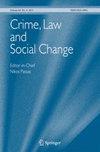影子政府结构和对反腐败执法的威胁:来自乌兹别克斯坦电信贿赂丑闻的证据
IF 1
4区 社会学
Q3 CRIMINOLOGY & PENOLOGY
引用次数: 0
摘要
公司和金融保密工具在促成跨国腐败方面所起的作用理所当然地受到了越来越多的学术和政策关注。然而,人们对政治保密工具所起的促进作用的关注较少。政治保密工具是指允许个人秘密行使公共权力的安排,这种安排被正式的官僚主义掩盖。本文发展了解构政治保密结构的分析范畴,并指出它们对反腐败执法构成的威胁。然后通过调查案例研究对这些结构和威胁进行实证研究。该案例研究描绘了乌兹别克斯坦的影子政治空间和公正的公共行政是如何被一个盗贼统治集团用来掩盖一个国际贿赂计划,然后被阴谋者用作武器,成功地挫败了欧洲的执法努力。根据案例研究的主要经验教训,提出了如何在法律上和实际中抵消政治保密结构所构成的威胁的建议。本文章由计算机程序翻译,如有差异,请以英文原文为准。
Shadow state structures and the threat to anti-corruption enforcement: evidence from Uzbekistan’s telecommunications bribery scandal
Abstract The role which corporate and financial secrecy vehicles play in enabling transnational corruption has justifiably received growing scholarly and policy interest. Less attention, however, has been given to the enabling role played by political secrecy vehicles. Political secrecy vehicles denote arrangements that allow individuals to clandestinely exercise public authority, which is concealed by a formal bureaucratic façade. This article develops analytical categories for deconstructing political secrecy structures and pinpointing the threat they pose to anti-corruption enforcement. These structures and threats are then empirically explored through an investigative case study. The case study plots how shadow political space in Uzbekistan and the simulacra of impartial public administration, was utilised by a kleptocratic syndicate to conceal an international bribery scheme, and then weaponised by the conspirators to successfully frustrate enforcement efforts in Europe. Drawing on key lessons from the case study, proposals are made for how the threats posed by political secrecy structures can be jurisprudentially and practically counteracted.
求助全文
通过发布文献求助,成功后即可免费获取论文全文。
去求助
来源期刊

Crime Law and Social Change
Multiple-
CiteScore
2.50
自引率
0.00%
发文量
53
期刊介绍:
Covers crime and deviance at the global, national, regional and local level, worldwideHas a special focus on financial crime, corruption, terrorism and organizational crimeWelcomes criminological research in the areas of human rights, comparative and international criminal law and criminal justice Crime, Law and Social Change publishes peer reviewed, original research articles addressing crime and the political economy of crime, whether at the global, national, regional or local levels, anywhere in the world. The Journal often presents work on financial crime, corruption, organized criminal groups, criminal enterprises and illegal markets, state crime, terrorism and security issues, cybercrime, cross-border crime and environmental crime. In addition, Crime, Law and Social Change welcomes criminological research in the areas of human rights, comparative and international criminal justice, compensation and justice for serious crime victims, international criminal law and cooperation. Finally, the Journal publishes multi-disciplinary criminological research focusing on gender, age, racial and ethnic equality issues.
 求助内容:
求助内容: 应助结果提醒方式:
应助结果提醒方式:


